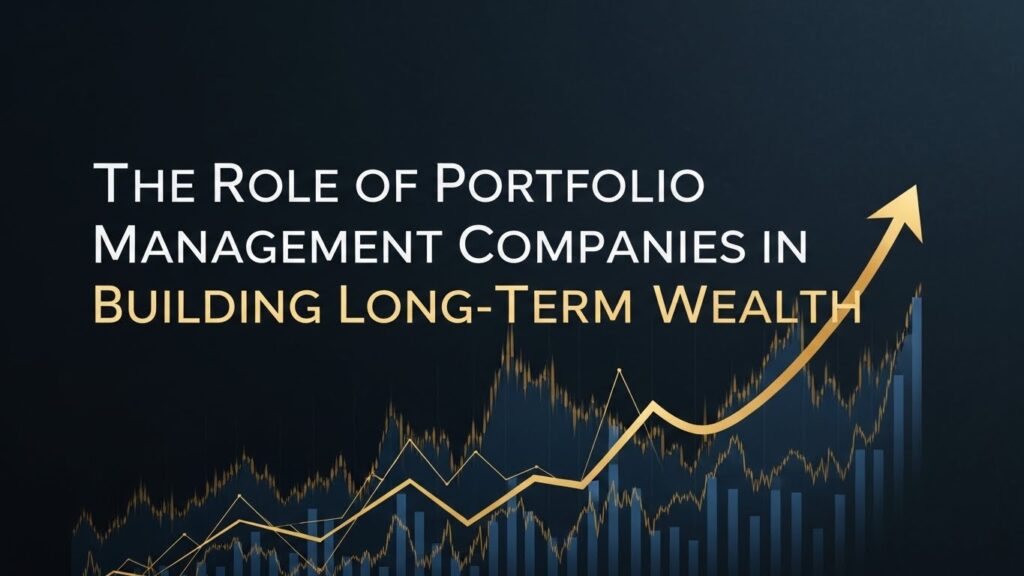The Role of Portfolio Management Companies in Building Long-Term Wealth
By 2026, India’s wealth landscape is being reshaped by what many describe as a “Great Wealth Transition.” With the domestic mutual fund industry nearing the $1 trillion AUM mark and a rapidly growing digitally native affluent class, traditional investment approaches are proving inadequate. Wealth management is evolving into a more structured, data-driven, and client-centric discipline.
This shift reflects how portfolio management companies are adapting to the new realities of 2026.

1. From Product-Centric to Goal-Centric Advisory
Modern wealth management has moved beyond standardized product recommendations. Instead, advisors increasingly apply goal-based investing, where portfolios are constructed around clearly defined life objectives.
How it works
Portfolio design begins with the end goal: funding a child’s overseas education, purchasing a second home, or building a retirement corpus. Advisors calculate the inflation-adjusted amount required and select assets based on the investor’s time horizon and risk tolerance.
Why it matters
A goal-linked structure helps investors remain disciplined during market volatility, reducing the likelihood of emotionally driven decisions such as panic selling.
2. The Era of Agentic AI and Hyper-Personalization
By 2026, wealth management has advanced beyond basic robo-advisory models. The industry increasingly relies on agentic AI — systems capable of autonomously analyzing data and executing portfolio tasks.
Key developments
- Hyper-personalization: AI engines continuously evaluate spending patterns, tax positions, life events, and macroeconomic indicators to refine portfolio recommendations.
- Proactive rebalancing: Instead of periodic reviews, portfolios are now dynamically adjusted in response to market events, policy changes, and geopolitical developments.
3. Democratization of Alternative Investments
Alternative assets are no longer limited to institutional or ultra-high-net-worth investors. In 2026, technology has broadened access for mass-affluent investors.
Notable trends
- Private credit and REITs: Investors increasingly allocate to private credit for income stability and to real estate investment trusts for participation in commercial property growth.
- Fractional ownership: Digital platforms and tokenization allow individuals to invest in infrastructure assets such as logistics parks or data centers with significantly lower capital requirements.
4. Global Integration and Geopolitics as a Portfolio Variable
Indian portfolios are becoming more globally diversified, reflecting the need to hedge currency risk and access international growth opportunities.
Strategic shifts
- Cross-border diversification: Investors balance domestic growth sectors with global innovation themes such as artificial intelligence, semiconductors, and renewable technologies.
- Geopolitical awareness: Portfolio construction increasingly incorporates trade policies, supply-chain realignments, and geopolitical risk as core inputs rather than afterthoughts.
5. Tax Efficiency and Multi-Generational Wealth Planning
With the revised tax structures of 2025–26, tax optimization has become a central element of portfolio management.
Core focus areas
- Tax-loss harvesting: Automated systems now identify opportunities to offset gains with realized losses on an ongoing basis.
- Estate and succession planning: The growing use of family trusts, structured succession frameworks, and comprehensive estate planning ensures continuity of wealth with reduced tax leakage and legal risk.
Conclusion
The wealth management environment of 2026 rewards informed, adaptive, and disciplined investors. Portfolio management companies are no longer merely product distributors; they function as long-term financial architects, integrating advanced technology, global diversification, behavioral discipline, and tax efficiency into a cohesive wealth strategy.
The future of wealth creation lies not in chasing returns, but in building resilient, purpose-driven portfolios designed to endure across market cycles and generations.
WELFIN INSIGHT
“The right insurance amount is not the cheapest or the highest it’s the one that fits your life.”

